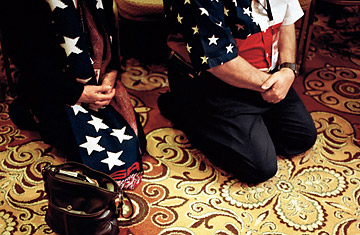
Convention attendees kneel in prayer at the National Tea Party Convention.
(2 of 6)
Now those people have a sort of political home. Across the country, from Muskegon, Mich., to Wetumpka, Ala., Tea Party meetings are being convened in restaurants and living rooms and libraries and office buildings--and online. Tea Party thinking has inspired hundreds of websites and Facebook pages. Yet there is no headquarters to visit, no chairman, no written platform and no chosen candidate--although the scramble for that mantle by the likes of Sarah Palin and Representative Ron Paul is as furious as the charge for the inside track at Talladega.
Perhaps this isn't surprising. With the economy shaken and unemployment sky-high, with the federal debt mounting by the trillion as Washington politicians pay lip service to fiscal responsibility (picture a sermon on humility delivered by Shaquille O'Neal), an outbreak of outrage was inevitable. The Tea Party movement is just one expression of a vast discontent unsettling the country. Recent polls have found that two-thirds of Americans describe themselves as dissatisfied or angry with their government--a huge, not-so-silent majority that ranges from conservatives convinced that Obama is a Maoist to liberals convinced that he is a corporate tool to Obama loyalists who resent that the President is suddenly facing such a rough road. Two out of three is an ocean of unhappiness, among the highest levels on record.
For Eileen Blackmer, whose Tea Party group in West Central Florida is called the Pinellas Patriots, the issue is trust. She doesn't have any left for the federal government. The answer, therefore, is a smaller government on a very short constitutional leash, with less spending and balanced budgets. Blackmer was galvanized to action by the debate over health care. "I read the entire bill, page after page after page," she said recently. "Everything's 'A committee will be formed.' We do need health care reform, but there are other things to do to control those costs. Quit making backroom deals, and let us have that transparency you keep talking about."
That trust deficit comes up in conversations with Tea Partyers everywhere. In Arlington, Va., Kevin Murphey said he would love to see a better health care system but has no confidence that the government can deliver one. "I can't trust them, and we can't afford it. They haven't proven to me that they can do anything efficient," he said. Murphey's recent Tea Party meeting consisted of just five guys in a bar, but that's not so bad for Arlington, home of the Pentagon. Protesting Big Government in Arlington is like disdaining microchips in San Jose.
